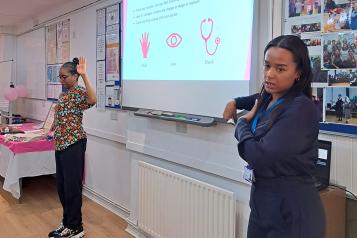Cleaning the home in order to minimise exposure to COVID-19

While you are cleaning it is very important not to touch your face at all, even if you are wearing gloves. You need to be really disciplined about not touching your face.
We are working with @UCLHresearch (the Biomedical Research Centre at UCLH) and our Diverse Communities partners to provide a series of health information workshops for local residents from migrant communities where English is not the first language. The content shared here comes from one such workshop.
Coronavirus (COVID-19) is still a new illness, and our knowledge about the virus is still developing. For the most up to date information about COVID-19 be sure to check Gov.uk
How is the virus transmitted from person to person?
- By droplets when we breathe, cough or sneeze.
- The virus is also transferred on surfaces, on anything a person with the virus touches.
The virus can survive on paper and card for two hours, and on plastics and metal for 72 hours. If you leave an area for 72 hours most of the virus (though not necessarily all) will have gone in that time. It will mostly survive where there are larger droplets of bodily fluids, faeces, or water droplets from coughing.
There may be situations where the risk of transmission is higher, for example if you are sleeping in a bedroom shared with someone with the virus, and where there are bodily fluids.
Cleaning to remove the virus
What to wear to protect yourself
To clean an area where there may be virus, you should wear disposable gloves and a disposable apron and you need to wash your hands for 20 seconds after finishing cleaning and removing all that protective clothing.
While you are cleaning it is very important not to touch your face at all, even if you are wearing gloves. So you need to be really disciplined about not touching your face.
Should I wear a mask?
There is a lot of controversy about masks. Generally they are of benefit in stopping you giving the disease to someone else. However, if you’re cleaning you might produce an aerosol (tiny particles suspended in the air that can cause infection) just by running a tap, for example. A mask might protect you from aerosols. The FF3 masks offer slightly better protection.
What to clean
If someone with Covid has only walked through an area, the risk in the environment is very small. Normal cleaning will be OK, and no special disinfectant is required.
However, when cleaning somewhere that an infected person has been for a long time, or an area with body fluids, the risk in the environment is higher. You need to pay attention to all the high contact areas – especially door handles, grab rails, telephones.
- Use disposable cloths or kitchen towel on all hard surfaces, sanitary fittings (toilet seats), chairs.
- The best thing to use is a combined detergent and disinfectant, with a chlorine content of 1,000 parts per million. Most household disinfectants are OK for this. Household detergent is also OK, but it’s good to follow this up with a disinfectant afterwards. It’s not a very resilient virus so basic cleaning products will work to remove it.
- Avoid splashing the cleaning liquids and water as they may contain droplets with traces of virus.
Cleaning furniture
For furniture and mattresses the government advice is to use a steam cleaner. But if you don’t have one you can vacuum clean these items. When vacuuming wear a mask. If it’s a wipeable surface you can use a disposable cloth and cleaning products. If that’s not possible a carpet shampoo or something similar will help. You don’t have to use bleach, the action of cleaning will remove the virus. You shouldn’t have to throw things away.
If you do a thorough clean you’ll get about 70% of surfaces cleaned and accidentally miss about 30%. If you clean the whole environment twice, you’ll reach about 90% and if you clean three times 98%. So cleaning 3 times is as effective as getting someone in with a UV cleaning machine to steam the home, but of course can take a long time. So there are people who hire steam cleaners. You can hire a steam cleaner and do it yourself but there’s still a risk of not covering everything.
Alternatively, if you remove anything with body fluids, then do a rough clean and leave the room for 72 hours you’ll remove the risk.
Cleaning clothes
Anything in contact with an individual who has Covid goes in the laundry at the highest temperature the fabric allows.
Some garments can only be washed at 30 degrees, that’s a fairly cool wash. Some of the virus might survive a 30 degree wash. Washing at 40 degrees or higher would almost certainly leave clothes free of the virus.
If the fabric only allows a cool wash then tumble dry or iron. This will kill the virus. Follow the standard cleaning guidance. If you can’t iron it or tumble dry then leave it to air for 24 hours before you put it on. Don’t shake the laundry as this allows particles to spread.
Adding disinfectant to the wash can also help (though be careful if it bleaches). The virus is not very resilient and so not that hard to get rid of.
Q&A
After the presentation, there was a question and answer session. Some of that discussion is shared below.
Q When we get a delivery, do we need to wipe our groceries? Does the fridge kill the virus?
A No. The fridge will not kill the virus. It can survive quite happily in the fridge. Some people ask should we wipe groceries as they come through the door. I think the risk of that is extremely low but I’d be careful to wash your hands, for at least 20 seconds, after putting shopping into the fridge.
If you are worried, wash your hands before doing anything else when you receive the bags. Then take out your shopping without touching the bag handles and wash your hands again, then pack away the items. The chances of catching the virus from anything in the bag, or the bag itself is unlikely – the driver would need to have the disease.
Q In the supermarkets – is it risky to buy things there in case people have been touching things already?
A There is a risk at the supermarket because it’s hard to socially distance – so going to the supermarket probably doubles your risk of catching the virus. The best way to avoid contact transmission is not to touch your face at all, from when you enter until when you can later wash your hands. The virus on your hands won’t harm you unless you a) touch your face or b) touch a surface and that holds it and then you or someone else touches that surface and then touches their face.
Q Can the virus survive for three weeks in the home (we know people who seem to have been re-infected)?
A It can only survive if it’s on a surface. We are still learning about the virus but we know it waxes and wanes (is stronger and weaker) over time. In the first couple of weeks the lungs have been damaged, lung function can vary over weeks, some people have had it six weeks and are still breathless. So it’s not likely it’s a re-infection, but the same illness that has been in the body but starts to show stronger symptoms.
We don’t know if people can be re-infected. The virus has not been around long enough. With other coronaviruses (Covid 19 is one of a group of illnesses related to the common cold) people who’ve had it are usually immune for at least a year, so we are hoping to have a vaccine by then.


